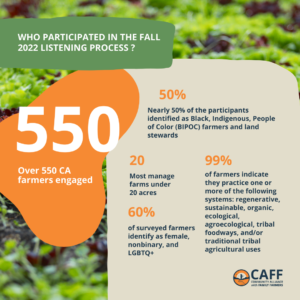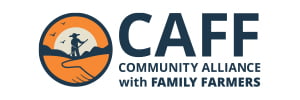In the Fall of 2022 we embarked on our annual intensive farmer listening process, organizing over a dozen multilingual farmer gatherings, distributing our online survey to hundreds of growers, and holding numerous one-on-one conversations. This process is an essential opportunity to connect directly with farmers in the community and determine what must be addressed in our policy platform. This year we heard from over 550 farmers and land stewards, from a wide range of voices across California from urban to rural, small and mid-sized, with a diversity of racial, cultural, and ethnic backgrounds.

Due to California’s budget deficit many of our 2023 priorities are focused on restoring budget cuts in Governor Newsom’s proposed budget which include inequitable reductions to programs aimed to support small and underserved farmers including Farm to Community Food Hubs Program, the Urban Agriculture Program, and the Beginning Farmer and Farmworker Training Program (BFFTP). The Newsom Administration has proposed cutting these programs by 50 to 100 percent. See our full response to the governor’s proposal, here. In addition to restoring the proposed budget cuts, we aim to focus on program implementation to ensure state programs provide maximum benefits for small-scale, beginning, and underserved food producers as well as new policies!
Below includes a very brief summary of our policy priorities.
For specific details on new policies and implementation goals please see our full report, here.
1) ACCESS TO WATER:
Water access was ranked the most critical issue for growers with over 70% of surveyed farmers reported to have been negatively impacted by the drought. Many rural farmers are suffering from the drought and have had their well dry up or their surface water completely cut off. Furthermore, urban farmers continue to struggle with high municipal water bills, in many cases made worse by the drought.

2) ACCESS TO LAND:
Land access and security are a fundamental challenge for California’s small-scale, beginning, and underserved farmers. With the combination of skyrocketing land prices, corporate investment firms buying up any available land, and warehouse development, these farmers have no other choice but to lease or stop farming altogether. At least 40% of surveyed farmers indicated they lease the land they cultivate, which limits their ability to invest in the land they are on and feel secure in their businesses.

3) ACCESS TO CAPITAL & INFRASTRUCTURE:
Most small and underserved farmers have been left out of any government grant opportunities that award many farmers the financial capital to invest in their farm infrastructure and sustainability. It is clear, that the majority of surveyed farmers have yet to receive government grants or believe these grants are supporting them.
Additional Priorities:
Of course, the major priorities above are not the only issues impacting farmers. We have identified the following priorities as essential and will support efforts to ensure resources and policies address these needs.
- Ecological Agriculture Resources & Training: More TA, training, and importantly peer-to-peer networks are needed to ensure farmers continue to implement these agricultural systems.
- Climate Change & Uncertainty: The past decade’s record-setting droughts, fires, precipitation events, and heat waves, have had disastrous effects on the health, landscape, and economic stability of our farmers. More investments in TA, farm insurance, appropriate on-farm research, and tools, are essential to support farmers survive the rapid climate shifts and uncertainty.
- Business Viability: Regional farmer training centers provide culturally relevant assistance for beginning farmers as well as continuing education for more established farmers. It is essential to continue investing in the development of new and existing training programs that will support the growth of food systems jobs and the local farming economy.
We hope you join us in this year’s campaigns to fight for these essential resources. If you’d like to learn more about the survey results, 2023 policy campaigns, and more please make sure you follow us on all social media platforms to stay up to day with our policy efforts, or contact our Policy Director, Jamie Fanous – jamie[at]caff.org


